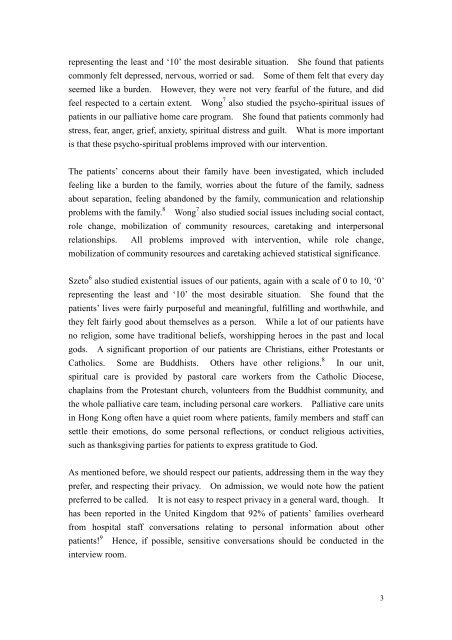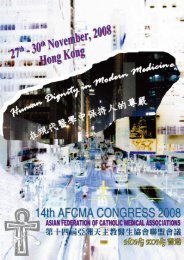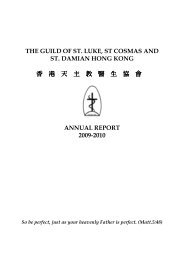Full paper Human dignity in patients with terminal illness
Full paper Human dignity in patients with terminal illness
Full paper Human dignity in patients with terminal illness
You also want an ePaper? Increase the reach of your titles
YUMPU automatically turns print PDFs into web optimized ePapers that Google loves.
epresent<strong>in</strong>g the least and ‘10’ the most desirable situation. She found that <strong>patients</strong>commonly felt depressed, nervous, worried or sad. Some of them felt that every dayseemed like a burden. However, they were not very fearful of the future, and didfeel respected to a certa<strong>in</strong> extent. Wong 7 also studied the psycho-spiritual issues of<strong>patients</strong> <strong>in</strong> our palliative home care program. She found that <strong>patients</strong> commonly hadstress, fear, anger, grief, anxiety, spiritual distress and guilt. What is more importantis that these psycho-spiritual problems improved <strong>with</strong> our <strong>in</strong>tervention.The <strong>patients</strong>’ concerns about their family have been <strong>in</strong>vestigated, which <strong>in</strong>cludedfeel<strong>in</strong>g like a burden to the family, worries about the future of the family, sadnessabout separation, feel<strong>in</strong>g abandoned by the family, communication and relationshipproblems <strong>with</strong> the family. 8 Wong 7 also studied social issues <strong>in</strong>clud<strong>in</strong>g social contact,role change, mobilization of community resources, caretak<strong>in</strong>g and <strong>in</strong>terpersonalrelationships.All problems improved <strong>with</strong> <strong>in</strong>tervention, while role change,mobilization of community resources and caretak<strong>in</strong>g achieved statistical significance.Szeto 6 also studied existential issues of our <strong>patients</strong>, aga<strong>in</strong> <strong>with</strong> a scale of 0 to 10, ‘0’represent<strong>in</strong>g the least and ‘10’ the most desirable situation. She found that the<strong>patients</strong>’ lives were fairly purposeful and mean<strong>in</strong>gful, fulfill<strong>in</strong>g and worthwhile, andthey felt fairly good about themselves as a person. While a lot of our <strong>patients</strong> haveno religion, some have traditional beliefs, worshipp<strong>in</strong>g heroes <strong>in</strong> the past and localgods. A significant proportion of our <strong>patients</strong> are Christians, either Protestants orCatholics. Some are Buddhists. Others have other religions. 8 In our unit,spiritual care is provided by pastoral care workers from the Catholic Diocese,chapla<strong>in</strong>s from the Protestant church, volunteers from the Buddhist community, andthe whole palliative care team, <strong>in</strong>clud<strong>in</strong>g personal care workers. Palliative care units<strong>in</strong> Hong Kong often have a quiet room where <strong>patients</strong>, family members and staff cansettle their emotions, do some personal reflections, or conduct religious activities,such as thanksgiv<strong>in</strong>g parties for <strong>patients</strong> to express gratitude to God.As mentioned before, we should respect our <strong>patients</strong>, address<strong>in</strong>g them <strong>in</strong> the way theyprefer, and respect<strong>in</strong>g their privacy.On admission, we would note how the patientpreferred to be called. It is not easy to respect privacy <strong>in</strong> a general ward, though. Ithas been reported <strong>in</strong> the United K<strong>in</strong>gdom that 92% of <strong>patients</strong>’ families overheardfrom hospital staff conversations relat<strong>in</strong>g to personal <strong>in</strong>formation about other<strong>patients</strong>! 9 Hence, if possible, sensitive conversations should be conducted <strong>in</strong> the<strong>in</strong>terview room.3




